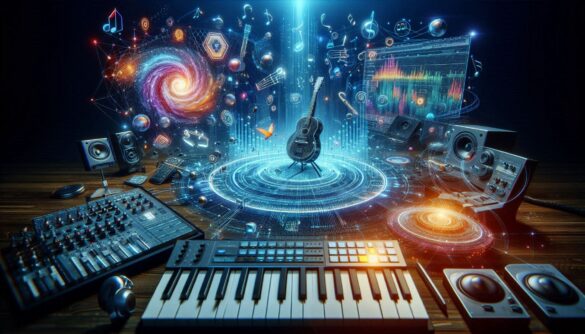In a world increasingly shaped by artificial intelligence, music creation is undergoing a radical transformation. AI music generation is no longer just a futuristic concept—it’s a growing field empowering musicians, producers, and even hobbyists to compose, remix, and innovate sound like never before. Whether you’re an artist looking to explore new creative horizons or a tech enthusiast curious about how machines can compose melodies,Create AI music is opening doors to limitless possibilities.
What Is AI Music?
AI music refers to audio compositions created or assisted by artificial intelligence algorithms. These systems analyze vast datasets of existing music—spanning genres, instruments, keys, and rhythms—to learn patterns and generate new compositions. Some AI models can even mimic the style of specific composers or artists, producing original work that resonates with familiar tones.
How It Works
Most AI music tools use machine learning techniques like:
- Deep Neural Networks: These models identify complex patterns in melodies, harmonies, and rhythms.
- Natural Language Processing (for lyrics): AI understands textual emotion and narrative flow.
- Generative Adversarial Networks (GANs): Used for producing more creative and less predictable outputs.
Training datasets usually include thousands of songs, which allow AI to learn musical structure, mood, tempo, and more.
Benefits of AI-Generated Music
1. Creativity Unleashed
AI can generate music ideas instantly, making it a powerful co-writer. Artists can use AI as a creative springboard—helping overcome writer’s block or experimenting with unfamiliar genres.
2. Accessibility
Even without formal music training, anyone can create compelling music using AI tools. This democratizes music production and gives rise to new voices in the industry.
3. Speed and Efficiency
AI drastically reduces the time it takes to compose background scores, jingles, or podcast themes. What once took hours can now be done in minutes.
4. Personalization
Streaming platforms and content creators can generate custom music tailored to mood, audience, or activity (e.g., workout, meditation, gaming).
Popular AI Music Tools
Several platforms have gained popularity for their capabilities:
- AIVA (Artificial Intelligence Virtual Artist): Great for orchestral and cinematic compositions.
- Amper Music: Easy-to-use tool for content creators to generate royalty-free background music.
- Soundraw: Combines AI with user customization to fine-tune music in real-time.
- Boomy: Allows users to create full songs in seconds and even publish them on streaming services.
Ethical and Creative Challenges
While AI music is exciting, it raises questions:
- Originality: Who owns AI-generated music?
- Creativity: Can a machine truly be creative, or is it just recombining patterns?
- Impact on Jobs: Will AI replace composers, or simply become another tool in their kit?
Most experts agree that AI won’t replace human musicians—it will augment their creativity. Like synthesizers and digital audio workstations before it, AI is just the next evolution in music technology.
The Future of AI Music
As AI models improve and integrate with more music production tools, we can expect:
- Real-time AI accompaniment in live performances.
- Hyper-personalized music tailored to biometric data (heart rate, mood, etc.).
- Collaboration between AI and human musicians as a new genre in itself.
Final Thoughts
AI music is not here to kill the soul of music—it’s here to amplify it. With the right balance of human emotion and machine intelligence, we’re entering an era where creativity knows no bounds. Whether you’re scoring a film, writing a pop song, or just exploring, creating AI music might just be your next great adventure.


